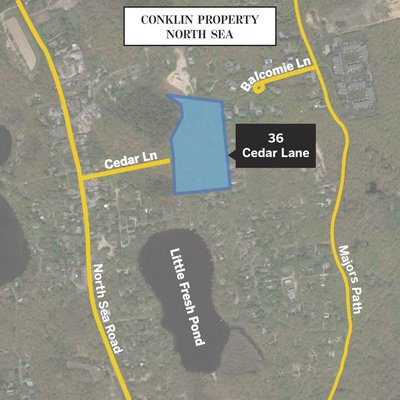
Southampton Town officials are continuing to discuss ways they could legally generate revenue from an already preserved North Sea property and use those proceeds to help finance a proposed affordable housing project in Speonk.
One option on the table, according to Town Supervisor Jay Schneiderman, is for the town to sell the development rights to the 10 acres—known as the Conklin property and acquired by the town in 2006 for $1.5 million—and apply those proceeds to pay back the town’s Community Housing Opportunity Fund, which invested $1 million in the original purchase.
It is unclear how much money such a sale could generate for the town, which originally intended to build 38 affordable housing units on seven acres while preserving the remaining land as open space. Complicating and eventually derailing those development plans was the fact that the property was never subdivided by the town and, last year, town officials said they would prefer to keep the land as open space.
But at a work session held earlier this month, Mr. Schneiderman floated a new idea, explaining that in addition to selling the development rights to the 10 acres, he was considering approaching state lawmakers to see if they could pass special legislation that would allow the town to tap its CPF and pay back the $1 million it would have to reimburse the affordable housing fund as there are no longer plans to develop the land on Cedar Lane as affordable housing.
That suggestion, however, was met with nearly immediate objection from one local state lawmaker who helped craft the CPF legislation.
“He’s being way too premature for this,” State Assemblyman Fred W. Thiele Jr. said, referring to Mr. Schneiderman’s suggestion about tweaking the CPF to permit such a payout. “Quite frankly, I think he should just sell the development rights. He shouldn’t be looking for a quick out from the state.”
In November, Mr. Schneiderman attempted to subdivide the seven acres into four lots, three of which would have been auctioned off at market rate leaving the fourth to accommodate affordable housing units. He said at the time that he wanted to use the proceeds to again pay back the affordable housing fund.
Those plans, however, were met with strong resistance from residents who did not want to see any of the 10 acres developed and subsequently killed.
“I think this has been one big screwup by Jay Schneiderman from the day he got into office,” Mr. Thiele said, referring to Mr. Schneiderman’s effort to subdivide and sell off a portion of the land.
The supervisor, who has found himself on the defensive in recent weeks over the suggestion, insisted that he was not trying “to step on anyone’s toes.”
He added: “I’m just trying to help solve a problem. I’m certainly not trying to mislead the public or to go back on a promise. I just want to come up with a way to reimburse the fund that the community would support.”
Mr. Schneiderman said he still wants to find a way to refund the $1 million to the affordable housing fund in order to subsidize a proposed 38-unit affordable housing complex, dubbed “Speonk Commons,” that would be built on 4.28 acres on North Phillips Avenue in Speonk. Georgica Green Ventures, a for-profit company that builds affordable and workforce housing complexes, originally pitched 51 apartments but has since reduced the proposal to 38 due to density concerns raised by neighbors. The company, which would build and manage the complex, would use the town funding to offset the loss of building fewer units.
The money generated by the sale of the development rights to the North Sea property, Mr. Schneiderman explained, would be used to subsidize the Speonk development and also keep those proposed apartments affordable for future tenants. Preliminary estimates have the developer charging between $930 and $1,750 a month for the units, which would include studios as well as one- and two-bedroom apartments.
At this juncture, Mr. Schneiderman said he is waiting for town officials to provide an estimated value of the development rights to the Conklin property, and whether it would be enough to pay back the housing fund.
“If they are meaningful, then we have a clear and painless path forward,” he said of the development rights. “If they are not, then the path forward is not clear and the Town Board will have to decide what approach, if any, is the correct course of action.”